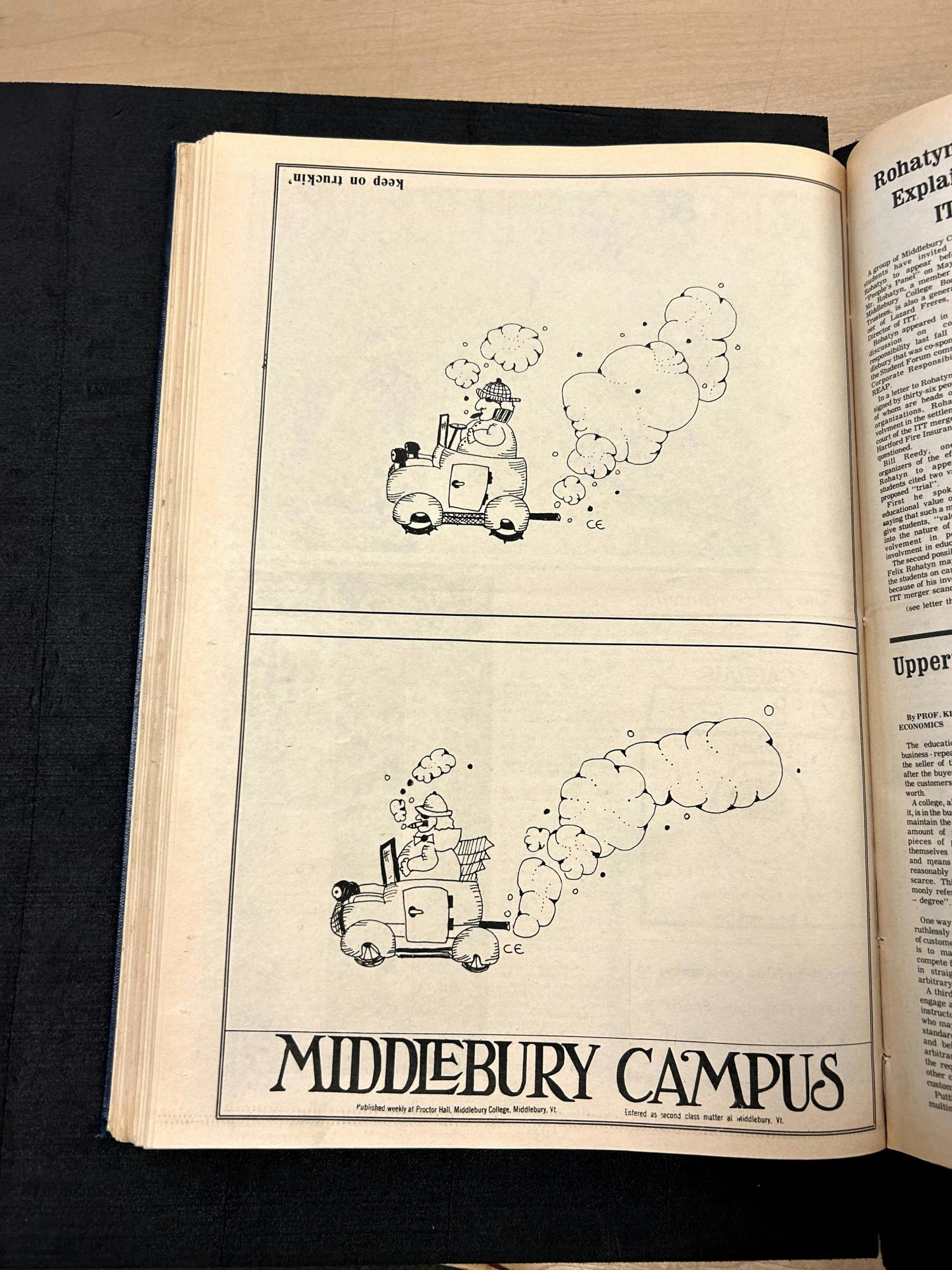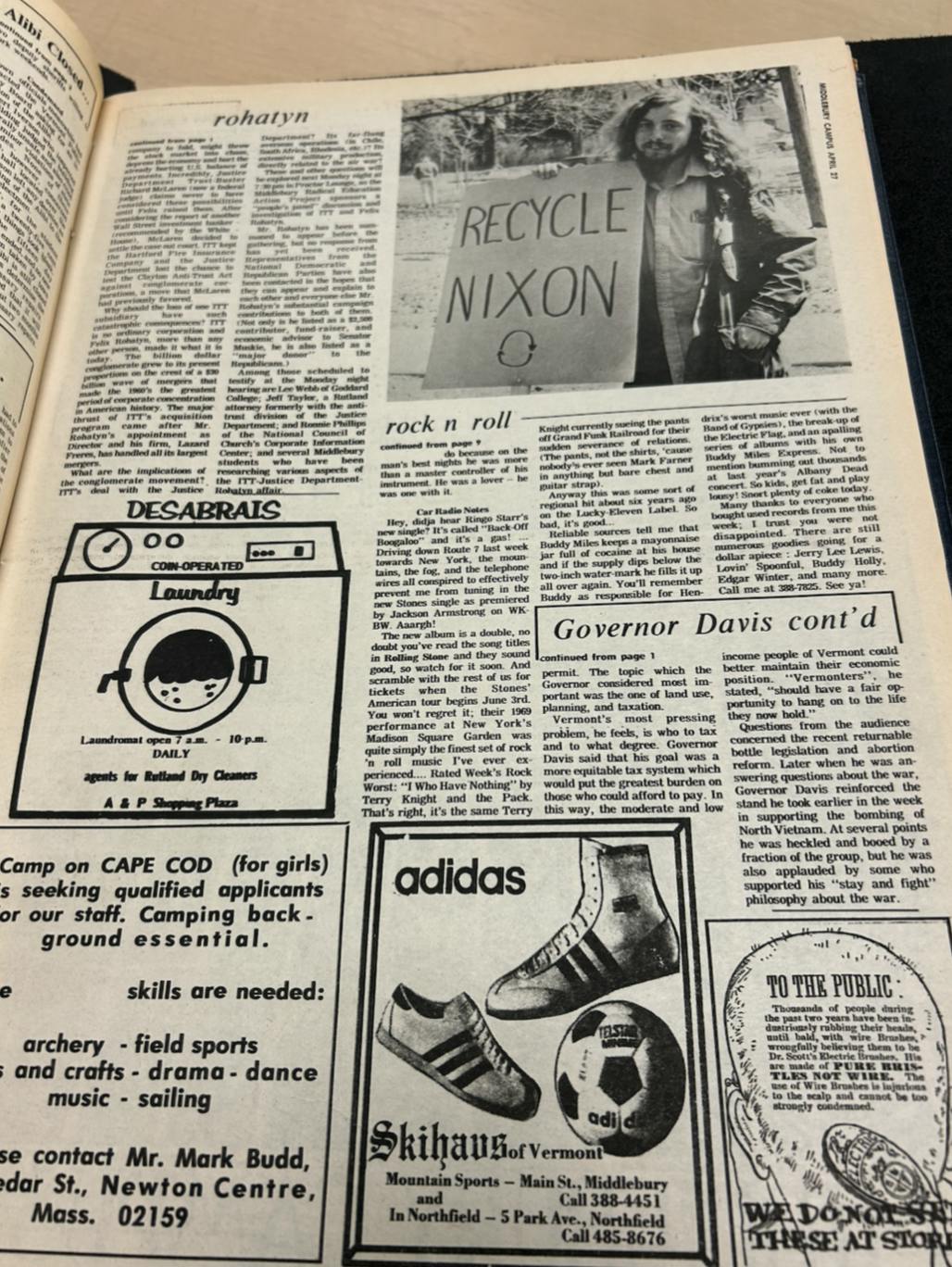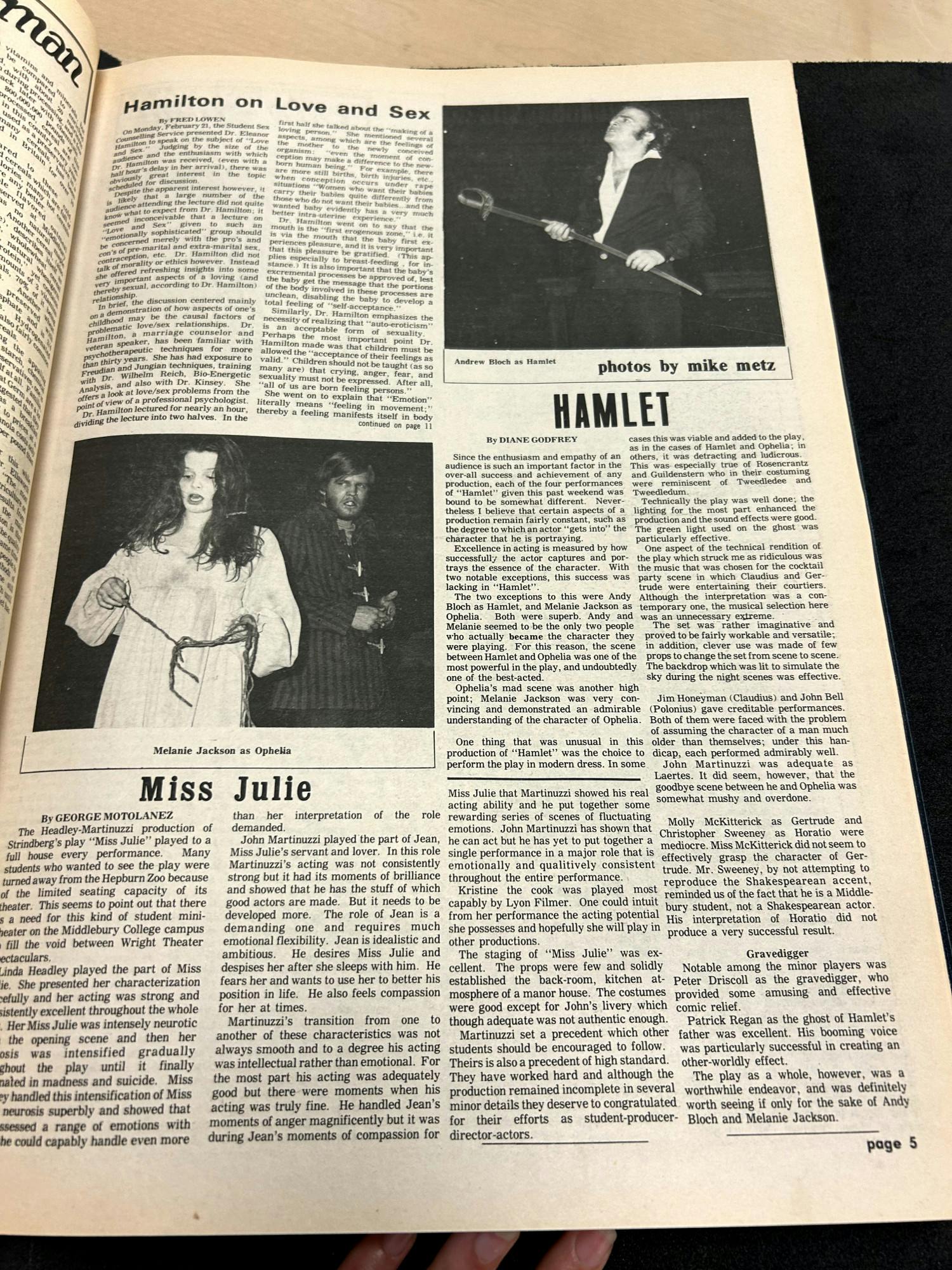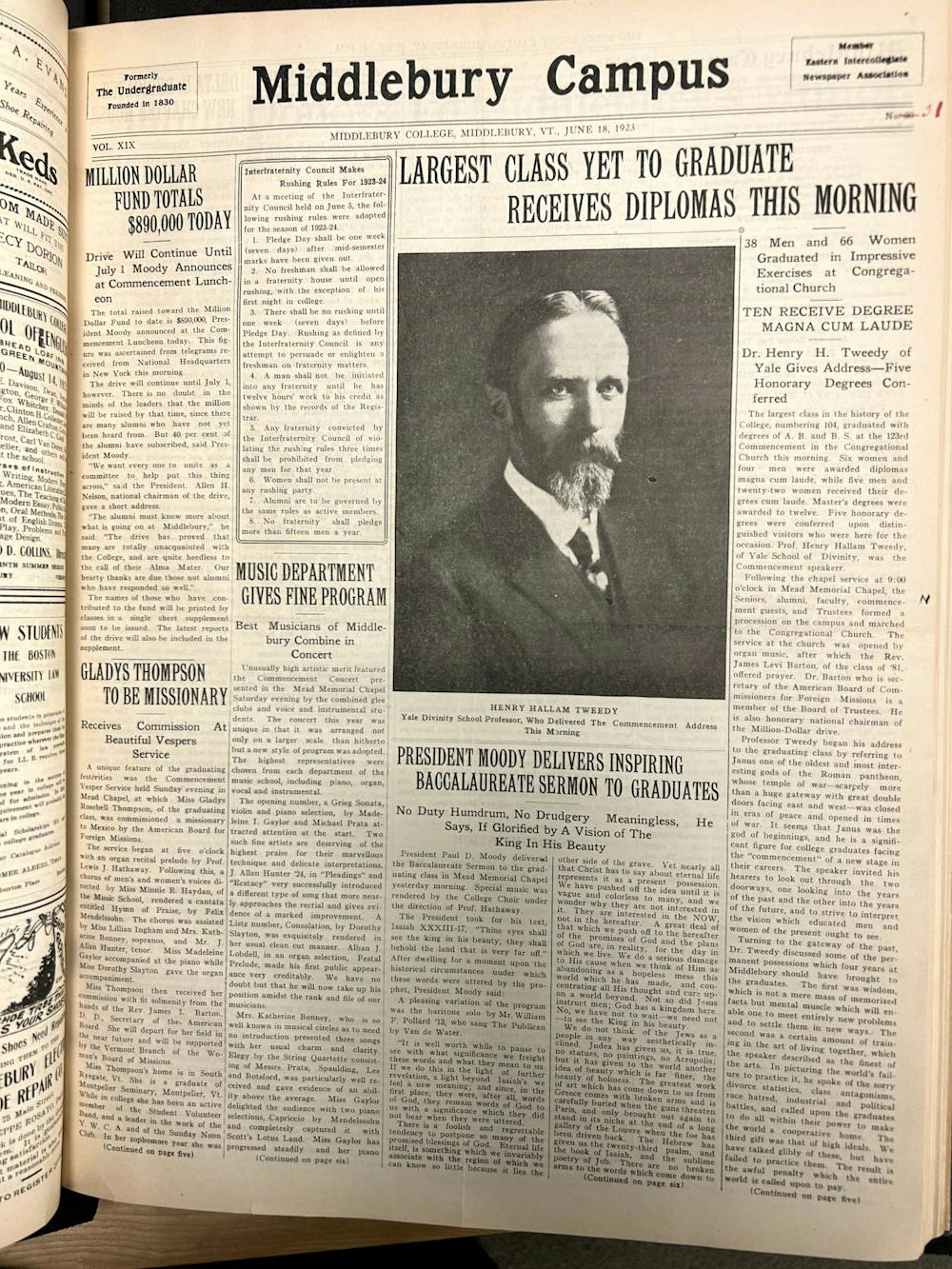“From the Archives” is an opportunity for various writers to visit the Middlebury Special Collections and write about a different artifact each week. The Special Collections boasts hundreds of thousands of historic items, and through this column we encourage writers to explore not only the college’s history, but also the history of the world around us.
“Largest class yet to graduate,” proclaims a headline in a final spring issue of The Campus, referring to the class of ’23. But of course, this is not about the class of 2023, which includes around 420 May graduates, down from the typical 630. This headline is from issue No. 31 of the 19th volume of The Campus, published on June 18, 1923.
A lot has changed since this graduation 100 years ago. For one thing, Middlebury’s student body has expanded. The “largest class in the history of the College,” as the article describes it, was just 104 students — 38 men and 66 women. An article in the first fall issue of the same year cites a total enrollment of 519, smaller than the average reg class size these days.
The pages of The Campus, too, have changed greatly over the last century. Middlebury Special Collections is home to a full run of the college’s student-run newspaper, with issues from its previous iteration — The Undergraduate, founded in 1830 — to the paper this article appears in. Browsing the leather-bound volumes of print editions from years past reveals that much of the paper’s coverage during this period revolved around sports. And there were many, many more ads — sometimes multiple pages worth — revealing what items or activities were of interest to college students of the day.
The Campus of a century ago published ads for cigarettes and alcohol (something that is now prohibited due to the college’s federal funding), Kodak film development, shoestrings, overcoats and “a good haircut and shave” at Gib’s the Barber on Merchants Row. One person who appears to be a student, Edith H. Tallmadge, placed a personal ad that ran for several weeks in a row, announcing a “party forming to visit France, Italy, Switzerland, Germany, Holland, Belgium, England, with Ireland optional.” Tallmadge instructed those interested to “write for cost and itinerary.”

Fast forward 50 years, and The Campus of the 70s was publishing coverage more similar to that of today — though, admittedly, the paper was embracing a magazine-esque style. One front page was composed of a full-page cartoon of a man smoking a cigar and sitting in a car. A 1972 issue devoted an entire two-page spread to a four panel comic under the text, “Meet Mr. Wizard.”

Gone were the front pages full of sports updates and event announcements of the 1920s. They were replaced by an analysis of Vermont taxes, coverage of a student forum passing a credit/no credit proposal and a story on the Community Council calling for co-ed frats. An April 27, 1972 issue featured a photograph of a student bearing a “recycle Nixon” sign above a headline that reads “rock ‘n roll.”
Some of the institutions and interests of this time have remained, though perhaps with increased prices, modern technology or the benefit of new scientific insight. An ad for Mister Up’s promotes Beefeater Gin martinis for 75 cents, while one for The Vermont Book Shop advertises books, tapes and records. Students often wrote about environmental concerns: An op-ed under the eye-catching headline “Make Your Car Eat Shit!” advocated for manure-based fuel amid concerns about air pollution from transportation.
Campus reporters of 50 years ago were amusingly matter-of-fact when writing about their peers. One 1972 issue contained an article on all the students who had left the college after the end of the preceding year, all under the headline “flunk outs, drop outs.” “One hundred sixty-six students took leaves of absence, seven transferred to other colleges, and twenty-four flunked out,” the writer said.

Another student wrote a mixed review of a 1972 production of Hamlet (which also happened to be the faculty show this spring). “John Martinuzzi was adequate as Laertes,” the reporter wrote. “It did seem, however, that the goodbye scene between he and Ophelia was somewhat mushy and overdone.”
As members of the current class of ’23 face the uncertainties of post-undergraduate life, now just a few weeks away, they might find comfort in the fact that apprehension about life after graduation is as much a constant at Middlebury as environmental activism, productions of Hamlet and trips to Mister Up’s.
Students of 50 years ago were apparently feeling similarly daunted by the prospect of graduating. In a fall 1972 issue of The Campus, a member of the class of 1973 penned an op-ed creatively titled “Thoughts on being a senior.” While the “ardent competitiveness” exhibited by underclassmen had faded from the ranks of that year’s graduating class, the seniors had a new reason for uneasiness, the writer explained.
“Now a fresh form of fear has developed: the fear of Out There,” the writer said. “For the first time in their lives many people are going to have to make some choices.”

Abigail Chang ’23 (she/her) is the Editor in Chief.
She previously served as a managing editor, Senior News Editor, News Editor and co-host of The Campus' weekly news radio show.
Chang is majoring in English and minoring in linguistics. She is a member of the Media Portrayals of Minorities Project, a Middlebury lab that uses computer-assisted and human coding techniques to analyze bulk newspaper data.
Throughout last year, Chang worked on source diversity and content audits for different media properties as an intern for Impact Architects LLC. Chang spent summer 2021 in Vermont, working as a general assignment reporter for statewide digital newspaper VTDigger. Chang is also a member of the Middlebury Paradiddles, an a cappella group.




